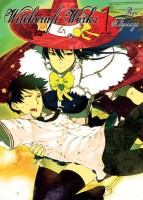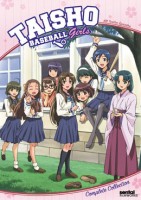My News and Reviews
I posted two reviews at Experiments in Manga last week. The first review was of Manazuru, Hiromi Kawakami’s first novel to be translated into English. It’s a slightly surreal but moving work about memory, loss, letting go, and moving on. I had previously read and enjoyed some of Kawakami’s short stories, but Manazuru is her first long-form work that I’ve read. The other review posted last week was a part of my monthly horror manga review project. In December I took a look at took a look at Setona Mizushiro’s After School Nightmare, Volume 1, but this month I started digging into Yuki Urushibara’s award-winning Mushishi, which happens to be one of my favorite manga series. (Next month will be After School Nightmare‘s turn once again, and I’ll continue to alternate between the series.)
On to other interesting news and reading! Sparkler Monthly has a new subscription model for the new year, which means even more of its content is now free. (But if you like what you see, please consider becoming a member!) Kodansha Comics announced several new licenses, including a new series from Blade of the Immortal‘s Hiroaki Samura among other intriguing manga. Amazon leaked Vertical Comics’ most recent acquisition announcement, Hajime Segawa’s Tokyo ESP. And speaking of Vertical, here’s a list of Vertical manga that may be going out of print in the near future. And completely unrelated, Gayumbos has an interview with Kazuhide Ichikawa, one of the creators featured in Massive: Gay Erotic Manga and the Men Who Make It.
Finally, I wanted to draw everyone’s attention to the Female Goth Mangaka Carnival which is currently under way and will continue through the end of January. Hosted by the The Beautiful World, which previously hosted the Kaori Yuki Manga Moveable Feast, the Carnival is focusing on Fujiwara Kaoru, Kusumoto Maki, Mitsukazu Mihara, Junko Mizuno, Asumiko Nakamura and their works. I have a few things in mind for the Carnival, including a spotlight on Mitsukazu Mihara, a manga giveaway that ties into the Carnival, and a review of Asumiko Nakamura’s Utsubora. Assuming all goes according to plan, my Carnival posts should start showing up by Friday.
Quick Takes
 Ani-Imo, Volume 1 by Haruko Kurumatani. I often enjoy body-swap manga, but I was somewhat wary of Ani-Imo. I’ll admit, the first volume actually wasn’t as terrible as I anticipated it would be. There were even parts of it that I legitimately liked. Still, overall I really can’t say that I enjoyed the manga. There’s a lot about Ani-Imo that frankly makes me uncomfortable. I’m actually not bothered by the potential incest itself (although the manga’s excuse that makes it not really incest seems awfully convenient and not particularly believable). However, I intensely disliked the doctor in the manga. He comes across as extremely predatory and unfortunately his bisexuality is used to emphasize that point. Also, the young women in the series, despite being high schoolers, look more like elementary grade students, which makes the sexual overtones of Ani-Imo even harder to take. Some of the manga’s creepiness I’m sure is intentional, but since the series seems to be trying to be a comedy. The balance of the series’ tone doesn’t seem quite right and the manga ends up being a bit off-putting.
Ani-Imo, Volume 1 by Haruko Kurumatani. I often enjoy body-swap manga, but I was somewhat wary of Ani-Imo. I’ll admit, the first volume actually wasn’t as terrible as I anticipated it would be. There were even parts of it that I legitimately liked. Still, overall I really can’t say that I enjoyed the manga. There’s a lot about Ani-Imo that frankly makes me uncomfortable. I’m actually not bothered by the potential incest itself (although the manga’s excuse that makes it not really incest seems awfully convenient and not particularly believable). However, I intensely disliked the doctor in the manga. He comes across as extremely predatory and unfortunately his bisexuality is used to emphasize that point. Also, the young women in the series, despite being high schoolers, look more like elementary grade students, which makes the sexual overtones of Ani-Imo even harder to take. Some of the manga’s creepiness I’m sure is intentional, but since the series seems to be trying to be a comedy. The balance of the series’ tone doesn’t seem quite right and the manga ends up being a bit off-putting.
 Manga Dogs, Volume 2 by Ema Toyama. Since Manga Dogs is more of a gag manga than anything else, there isn’t really much of a driving plot to the series. Instead there’s the initial setup (a high school with a new, but abysmally supported manga program) and the introduction of the main players (Tezuka and the three classmates who have attached themselves to her, as well as a small handful of supporting cast members) which serve as the starting point for all of the hijinks in the series. I’m not really sure where Manga Dogs is heading, or even if it is heading anywhere, but I do find it amusing. Granted, much of the humor depends on a reader having a deeper interest in and understanding of manga and its creation than the casual fan might generally possess. The other major source of the series’ comedy are the goofball antics of Tezuka’s enthusiastic yet delusional devotees—Specs, Prince, and Dream Kid. But, surprisingly enough, although they’re usually air-headed idiots, every once in a while the three of them actually do exhibit some common sense.
Manga Dogs, Volume 2 by Ema Toyama. Since Manga Dogs is more of a gag manga than anything else, there isn’t really much of a driving plot to the series. Instead there’s the initial setup (a high school with a new, but abysmally supported manga program) and the introduction of the main players (Tezuka and the three classmates who have attached themselves to her, as well as a small handful of supporting cast members) which serve as the starting point for all of the hijinks in the series. I’m not really sure where Manga Dogs is heading, or even if it is heading anywhere, but I do find it amusing. Granted, much of the humor depends on a reader having a deeper interest in and understanding of manga and its creation than the casual fan might generally possess. The other major source of the series’ comedy are the goofball antics of Tezuka’s enthusiastic yet delusional devotees—Specs, Prince, and Dream Kid. But, surprisingly enough, although they’re usually air-headed idiots, every once in a while the three of them actually do exhibit some common sense.
 Witchcraft Works, Volumes 1-2 by Ryu Mizunagi. Witches seem to be showing up in anime and manga more and more often these days, but I don’t have a particular interest in them. I almost passed over Witchcraft Works because of that. But since it’s a manga being released by Vertical Comics, I was a little more inclined to check it out. That and I generally liked the artwork; the cover in particular is striking, but the interior art looks great, too (even if some of the character designs tend to be absurdly buxom). So far, Witchcraft Works is a delightfully strange and quirky manga, it’s ridiculousness and weirdness making it a lot of fun. I’m especially enjoying the reversals in the usual gender roles—Honoka, the male lead, is the one who needs saving and protecting while Ayaka, the female lead, is the strong and stoic hero. (I also love that she’s at least a head taller than him.) Ayaka is an incredibly powerful fire witch which means many of the action sequences are done and over with before they’ve really had the chance to begin, but at least she puts an end to things with flair. And often literally with flare.
Witchcraft Works, Volumes 1-2 by Ryu Mizunagi. Witches seem to be showing up in anime and manga more and more often these days, but I don’t have a particular interest in them. I almost passed over Witchcraft Works because of that. But since it’s a manga being released by Vertical Comics, I was a little more inclined to check it out. That and I generally liked the artwork; the cover in particular is striking, but the interior art looks great, too (even if some of the character designs tend to be absurdly buxom). So far, Witchcraft Works is a delightfully strange and quirky manga, it’s ridiculousness and weirdness making it a lot of fun. I’m especially enjoying the reversals in the usual gender roles—Honoka, the male lead, is the one who needs saving and protecting while Ayaka, the female lead, is the strong and stoic hero. (I also love that she’s at least a head taller than him.) Ayaka is an incredibly powerful fire witch which means many of the action sequences are done and over with before they’ve really had the chance to begin, but at least she puts an end to things with flair. And often literally with flare.
 Taisho Baseball Girls directed by Takashi Ikehata. Although I’ve discovered that I generally enjoy sports anime, I was particularly interested in Taisho Baseball Girls because of its historical setting. Not many series take place during the Taisho era, a time period in which Japan was becoming increasingly Westernized and there was some societal anxiety caused by that. Although the twelve-episode anime is based on an ongoing series of light novels written by Atsushi Kagurazaka, it tells a complete and very satisfying story. A group of nine high school girls band together to form a baseball team in order to challenge an all-boys team and prove that women’s place in the world shouldn’t be and isn’t limited to the household. The problem is that very few of the girls actually have any experience playing baseball. Taisho Baseball Girls is a charming and heartwarming series without being overly sentimental. Some of the girls’ family members, friends, and teachers oppose what they’re doing and their unladylike behavior while others are incredibly supportive of them and their hard work.
Taisho Baseball Girls directed by Takashi Ikehata. Although I’ve discovered that I generally enjoy sports anime, I was particularly interested in Taisho Baseball Girls because of its historical setting. Not many series take place during the Taisho era, a time period in which Japan was becoming increasingly Westernized and there was some societal anxiety caused by that. Although the twelve-episode anime is based on an ongoing series of light novels written by Atsushi Kagurazaka, it tells a complete and very satisfying story. A group of nine high school girls band together to form a baseball team in order to challenge an all-boys team and prove that women’s place in the world shouldn’t be and isn’t limited to the household. The problem is that very few of the girls actually have any experience playing baseball. Taisho Baseball Girls is a charming and heartwarming series without being overly sentimental. Some of the girls’ family members, friends, and teachers oppose what they’re doing and their unladylike behavior while others are incredibly supportive of them and their hard work.
